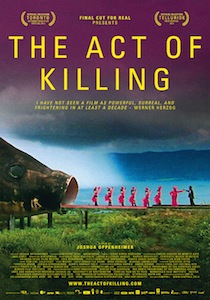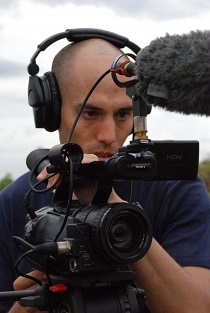 The controversial and highly provocative documentary The Act of Killing comes out this Friday at Alamo Drafthouse Mainstreet. Trey had the chance to talk with director Joshua Oppenheimer about his approach to filming known perpetrators of mass killings in Indonesia. Needless to say it is a fascinating and important conversation.
The controversial and highly provocative documentary The Act of Killing comes out this Friday at Alamo Drafthouse Mainstreet. Trey had the chance to talk with director Joshua Oppenheimer about his approach to filming known perpetrators of mass killings in Indonesia. Needless to say it is a fascinating and important conversation.
Because of its subject matter, The Act of Killing is unlike any other documentary I can remember. It focuses on Anwars Congo and a number of Indonesian men who are known to have run death squads in 1965, when the army was trying to exterminate suspected communists.
Due to the pointed nature of the subject matter, I attempted to ask Josh questions about his approach and craft, but we often drifted into the murky waters of the intent, redemption, and humanity of his subjects.
The conversation was incredible, and lasted about 25 minutes. I would encourage you to listen to the link below, since the partial transcript that follows doesn’t do justice to the thoughtfulness of Josh’s answers. I promise that you will not be disappointed, and you must make time for The Act of Killing when it comes out this weekend.
Trey: I have a quick warm up question. I teach at Film at the Kansas City Art Institute, so I’m always interested in influences. Do you have a handful of documentary or narrative films that you’ve found very influential; that you think film students should watch.
 Josh: Sure.
Josh: Sure.
Werner Herzog’s Even Dwarfs Started Small (1970)
Abbas Kiarostami’s Close-up (1990)
Mohsen Makhmalbaf’s Salaam Cinema (1995)
Dusan Makavejev’s WR: Mysteries of the Organism (1971) and Sweet Movie (1974)
Jean-Luc Godard’s Pierrot le Fou (1965)
Tsai Ming-liang’s The Hole (1999)
Trey: And if you want to add anymore as the interview goes on, feel free to add more.
Josh: (laughs) If they occur to me as I talk I will.
Trey: So to The Act of Killing, how did this project start? Just as a little background.
Josh: I began this work as in collaboration with a community of survivors, with whom I made a film about the abuse they faced on a Belgian owned plantation, an oil palm plantation about 30 miles from Medan. I made that where we made The Act of Killing in 2002.
We knew that when we were filming there that the parents and grandparents of the plantation workers had been in a union. They were accused of being communist sympathizers because they were in a union. In 1965 they had been thrown into concentration camps and then dispatched by the army to the local death squads to be killed.
We knew that we would go back to make a film about that straight away. They asked us to. They said please come back and expose what happened, and above all the regime of fear and corruption that’s been in place ever since, because of what happened and because of the misremembrance of what happened – the celebration of the atrocities as something heroic.
So we went back right away in 2003 and tried to make the film with the survivors, but word had gotten out that we were interested in what happened in 1965 and we were constantly stopped by the army. The military would come and the police would come. They would take our cameras. They would take our tapes. They would detain us, and it was really impossible to get anything filmed.
The survivors sent us on these missions to film perpetrators they knew who were their neighbors to see if we might be able to find out anything about how their loved ones had died.
We did this very cautiously at first, but found that the perpetrators were immediately open. Not just willing to talk, but boastful about the most horrific stories of mass killings. I remember feeling at that point it’s as though we’ve wandered into Germany 40 years after the Holocaust to find that the killers, that the Nazis, were still in power.
And yet as horrible and important as this situation is and perhaps the shamelessness of the perpetrators is a little bit unique, overall this is not unique. This is utterly ordinary.
Because I began this journey making a film about the abuse on a Belgian oil palm plantation in 2001 and 2002, I recognize that everything that we buy is produced in places like this. That our government, with our tax money, has engineered the whole global South to be a source of cheap and easily exploited labor by fomenting violence, the traumatic. It’s actually what Naomi Klein talks about in her book The Shock Doctrine. Mass political violence when perpetrators win build regimes of fear so oppressive that the people who make everything that we buy from clothes to electronics to the palm oil in our margarine and in our skin creams, the people who make everything we buy are too afraid, too oppressed to get the human costs of what we buy incorporated into the price tag that we pay.
So I recognize that this horrific situation of coming to Germany 40 years after the holocaust and finding the Nazis still in power is of supreme importance all the more so, because it is not unusual. It is actually the foundation, of our whole economic order. I knew that this situation would require of me whatever it took, and as long as it took I would have to spend. I would have to give as much of my life as was necessary to understand and deal with the situation.
When it was not safe to film with the survivors, they said to continue to film with the perpetrators. They’ll see them boasting. They’ll see why we’re afraid. They’ll see the nature of this whole regime.
I filmed every perpetrator I could find across the region. I found they were all boastful and they were all eager to take me to the places where they had killed and reenacted to demonstrate how they had done it. I filmed every perpetrator who I could find, up the chain of command, working my way from the countryside to the city, until I met Anwars. Anwars was the 41st of the perpetrators that I filmed, and that scene on the roof with him at the beginning, where he dances the Cha-cha-cha, was the very first time I’d filmed him.
Click the link to listen to the full audio for my interview with Joshua Oppenheimer, which includes additional questions and conversation. Interview begins at 1:22.







Comments on this entry are closed.